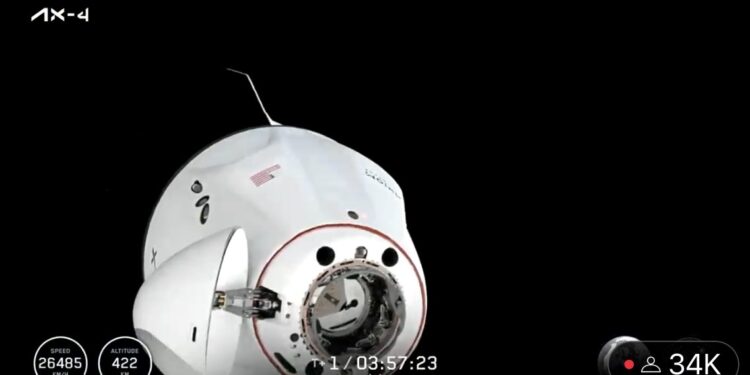Cape Canaveral, Florida – June 26, 2025: In a historic moment for India’s space program, Group Captain Shubhanshu Shukla became the first Indian astronaut to reach the International Space Station (ISS) as the Axiom-4 mission successfully docked with the orbiting laboratory on Thursday at approximately 4:30 PM IST (7:00 AM EDT). The SpaceX Crew Dragon capsule, named “Grace,” carried Shukla and three other astronauts on a 14-day mission after launching from NASA’s Kennedy Space Center in Florida on June 25.
The Axiom-4 mission, a collaboration between Axiom Space, NASA, and the Indian Space Research Organisation (ISRO), marks India’s return to human spaceflight after 41 years. Shukla, a 39-year-old Indian Air Force test pilot, is only the second Indian to travel to space, following Wing Commander Rakesh Sharma’s 1984 mission aboard a Soviet spacecraft.
Shukla, serving as the mission pilot, played a key role in monitoring the spacecraft’s trajectory during the automated docking with the ISS’s Harmony module. The crew, led by Commander Peggy Whitson of the United States, also includes mission specialists Slawosz Uznanski-Wisniewski of Poland and Tibor Kapu of Hungary. The team was welcomed aboard the ISS by the Expedition 73 crew for a safety briefing.
During their two-week stay, the Axiom-4 astronauts will conduct around 60 scientific experiments, including seven led by Shukla focused on microgravity research, such as food nutrition and plant growth. The mission also includes public outreach activities to inspire the next generation of space explorers.
“This is not just my journey, but the journey of India’s human spaceflight program,” Shukla said in a live broadcast from the Crew Dragon, proudly displaying the Indian flag on his spacesuit. He described the launch as “magical” and dedicated the mission to India’s 1.4 billion people.
Indian Prime Minister Narendra Modi hailed the mission as a “proud moment” for the nation, emphasizing its significance for India’s upcoming Gaganyaan program, which aims to send Indian astronauts into orbit by 2026. The Axiom-4 mission underscores India’s growing role in global space exploration and international collaboration.
The Crew Dragon “Grace,” the fifth in SpaceX’s fleet for human spaceflight, carried a plush swan toy named “Joy” as a zero-gravity indicator, chosen by Shukla in honor of his six-year-old son. The crew is set to return to Earth with a splashdown off the coast of California after completing their mission.
This milestone not only celebrates Shukla’s achievement but also highlights India’s ambitions to establish its own space station by 2035 and pursue crewed missions to the Moon and beyond.
Sources: NASA, Axiom Space, Indian Space Research Organisation (ISRO), SpaceX




































